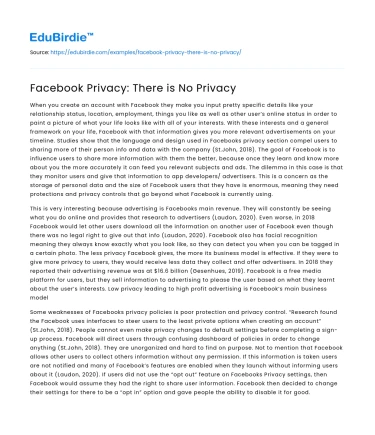When you create an account with Facebook they make you input pretty specific details like your relationship status, location, employment, things you like as well as other user’s online status in order to paint a picture of what your life looks like with all of your interests. With these interests and a general framework on your life, Facebook with that information gives you more relevant advertisements on your timeline. Studies show that the language and design used in Facebooks privacy section compel users to sharing more of their person info and data with the company (St.John, 2018). The goal of Facebook is to influence users to share more information with them the better, because once they learn and know more about you the more accurately it can feed you relevant subjects and ads. The dilemma in this case is that they monitor users and give that information to app developers/ advertisers. This is a concern as the storage of personal data and the size of Facebook users that they have is enormous, meaning they need protections and privacy controls that go beyond what Facebook is currently using.
This is very interesting because advertising is Facebooks main revenue. They will constantly be seeing what you do online and provides that research to advertisers (Laudon, 2020). Even worse, in 2018 Facebook would let other users download all the information on another user of Facebook even though there was no legal right to give out that info (Laudon, 2020). Facebook also has facial recognition meaning they always know exactly what you look like, so they can detect you when you can be tagged in a certain photo. The less privacy Facebook gives, the more its business model is effective. If they were to give more privacy to users, they would receive less data they collect and offer advertisers. In 2018 they reported their advertising revenue was at $16.6 billion (Gesenhues, 2019). Facebook is a free media platform for users, but they sell information to advertising to please the user based on what they learnt about the user’s interests. Low privacy leading to high profit advertising is Facebook’s main business model
Save your time!
We can take care of your essay
- Proper editing and formatting
- Free revision, title page, and bibliography
- Flexible prices and money-back guarantee
Some weaknesses of Facebooks privacy policies is poor protection and privacy control. “Research found the Facebook uses interfaces to steer users to the least private options when creating an account” (St.John, 2018). People cannot even make privacy changes to default settings before completing a sign-up process. Facebook will direct users through confusing dashboard of policies in order to change anything (St.John, 2018). They are unorganized and hard to find on purpose. Not to mention that Facebook allows other users to collect others information without any permission. If this information is taken users are not notified and many of Facebook’s features are enabled when they launch without informing users about it (Laudon, 2020). If users did not use the “opt out” feature on Facebooks Privacy settings, then Facebook would assume they had the right to share user information. Facebook then decided to change their settings for there to be a “opt in” option and gave people the ability to disable it for good.
I don’t necessarily believe Facebook can have a great business model without fixing privacy issues. They are making most of their profits from advertisements and putting a greater security on privacy info will just decrease the amount they give out to advertisement agencies. Because of this, Facebook would need more user’s information in order to make ads specific based on user’s interests, which is invading people’s privacy. I think there are ways Facebook could increase security for privacy information or at least avoid using people’s information by first off letting users know their policy for using peoples Info for advertisement purposes, so people are informed that what they post online Facebook will be allowed to use it. With that, users could accept or decline if Facebook could have access to their data. Facebook has started to try and incorporate new rules on privacy protection because of criticism they have been receiving. They changed their “privacy policy in order for it to be easy when choosing their privacy preferences and know what they are agreeing to” (Laudon, 2020).
References
- Gesenhues, A., Gesenhues, A., Gesenhues, A., & Gesenhues, A. (2019, January 31). Facebook ad revenue tops $16.6 billion, driven by Instagram, Stories. Retrieved from https://martechtoday.com/despite-ongoing-criticism-facebook-generates-16-6-billion-in-ad-revenue-during-q4-up-30-yoy-230261
- John, A. S. (n.d.). CR Researchers Find Facebook Privacy Settings Maximize Data Collection. Retrieved from https://www.consumerreports.org/privacy/cr-researchers-find-facebook-privacy-settings-maximize-data-collection/
- Laudon, K. C., & Laudon, J. P. (2020). Management information systems: managing the digital firm. Harlow, United Kingdom: Pearson Education.
Did you like this example?
Make sure you submit a unique essay
Our writers will provide you with an essay sample written from scratch: any topic, any deadline, any instructions.
Cite this paper
-
APA
-
MLA
-
Harvard
-
Vancouver
Facebook Privacy: There is No Privacy.
(2022, Jun 09). Edubirdie. Retrieved December 22, 2024, from https://edubirdie.com/examples/facebook-privacy-there-is-no-privacy/
“Facebook Privacy: There is No Privacy.” Edubirdie, 09 Jun. 2022, edubirdie.com/examples/facebook-privacy-there-is-no-privacy/
Facebook Privacy: There is No Privacy. [online].
Available at: <https://edubirdie.com/examples/facebook-privacy-there-is-no-privacy/> [Accessed 22 Dec. 2024].
Facebook Privacy: There is No Privacy [Internet]. Edubirdie.
2022 Jun 09 [cited 2024 Dec 22].
Available from: https://edubirdie.com/examples/facebook-privacy-there-is-no-privacy/
copy






 Stuck on your essay?
Stuck on your essay?

